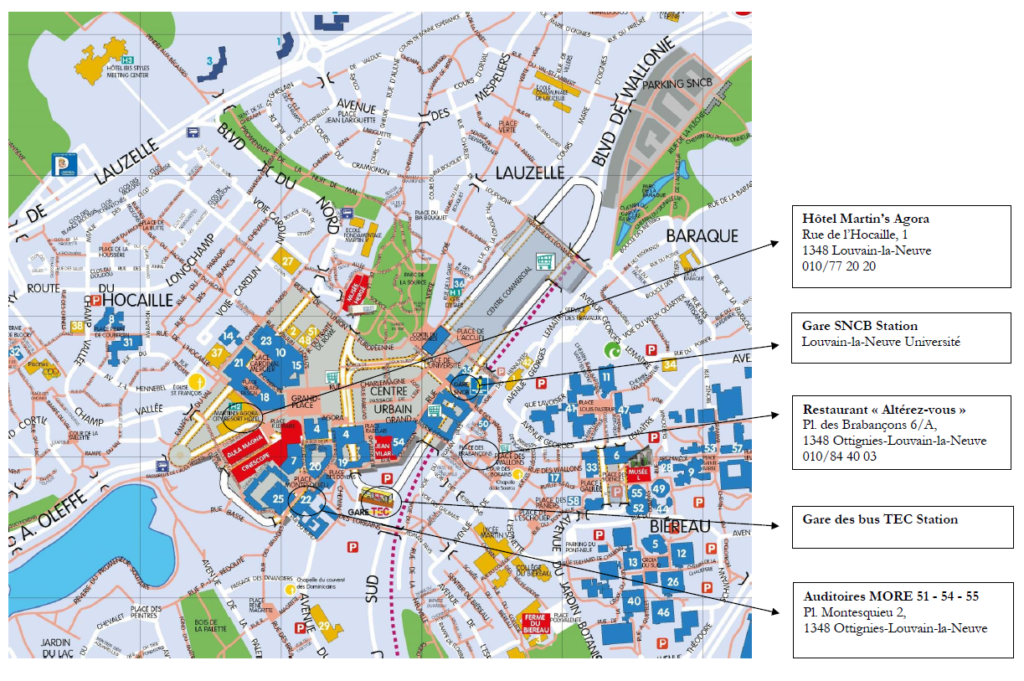Overcoming Obstacles to Climate Change Mitigation:
a cross-cutting approach by human and social sciences
Réduire les freins à l'engagement climatique : une approche transversale par les sciences humaines et sociales
Programme de la conférence – Conference program
Hybrid conference: online and in Louvain-la-Neuve (Place Montesquieu 2, 1348 Louvain-la-Neuve, Belgium)
Languages of the conference: English and French
23 May 2024
9h00 Salle/Room MORE 51
Bienvenue – Welcome
9h15
Discours d’ouverture avec les autorités de l’Université et JPI Climate – Opening speech with UCLouvain & JPI Climate authorities
9h45-12h15
Résultats du projet Réduire les freins à l’engagement climatique : une approche transversale par les sciences humaines et sociales – Results from the JPI Climate project Overcoming Obstacles and disincentives to Climate Change Mitigation: a cross-cutting approach by human and social sciences
Belgium (9h45-10h30): Obstacles, values, and linguistic aspects on digital social media – Louise-Amélie Cougnon, Andrea Catellani, Yuliya Samofalova (UCLouvain)
France (10h30-11h15): Attitude et Normes : conformisme et résistance – Armelle Nugier, Rosie Harrington, Michel Streith (Université Clermont Auvergne)
Norway (11h15-12h00): How citizens view possibilities for and obstacles to GHG emissions reductions. Analyses of surveys in Belgium, France and Norway. Kjersti Flottum, Øyvind Gjerstad (University of Bergen)
Final remarks
12h15
Présentation flash des POSTERS (3 min chacun) – POSTERS’ flash presentation (3 min each)
12h30-14h00
Lunch pour intervenant.e.s et auteurs des posters – Lunch for speakers & posters’ authors
14h00-16h00
Présentations des intervenant.e.s – Speakers’ presentations
Salle/Room MORE 51 – Pistes d’éducation et communication pour le climat
Coline Ruwet (ICHEC), Émeline de Bouver (Écotopie) Vers une éducation au climat robuste et émancipatrice ? Regards croisés sur la fresque climat
Nathalie Maroun (element) Regards croisés entre le management du changement et la communication sensible
Patricia Cortés (UCLouvain) Dialogue compétence spirituelle et changement climatique. L’engagement climatique chez les enfants et les adolescents
Alexandra Juster (Université de Innsbruck) Un discours interdisciplinaire pour lutter contre la crise climatique
Salle/Room MORE 54 – Local-based climate action and education
Christian Klöckner (Norwegian University of Science and Technology) Climate action at the neighbourhood level – how important are individual and collective factors?
Evan Boyle, Alexandra Revez, Aoife Deane, Brian Ó Gallachóir (MaREI Centre for Energy Climate and Marine – University College Cork) Community benefit funding and participation in renewable energy infrastructure development
Xavier Marichal (UCLouvain) Reflexive lessons drawn from an object mutualization initiative: economic or behavioural challenge?
Roberto Franzini Tibaldeo (Pontifícia Universidade Católica do Parana) The Transformative Potential of Place-Responsive Education
Salle/Room MORE 55 – Strategies and dialogue for climate change mitigation
Viktoria Allert (Technical University of Dortmund), Gerhard Reese (RPTU Kaiserslautern-Landau) On the challenges of civic engagement in the mobility transition – A conceptual analysis of the linkages of car-dependence and collective action
Camille Langlais (Université de Caen Normandie), Cécile Sénémeaud (Université de Caen Normandie), Christophe Demarque (Aix-Marseille Université) Reducing the psychological distance of climate change to promote mitigation: What if it depends on mitigation practices?
Jo Katambwe (Université du Québec à Trois-Rivières) Will dialogue save the fate of the planet? A socio-pragmatic analysis of the effectiveness of the COP
Alexis Gay, Angel Vincent, Dantzer Cécile (Université de Bordeaux) Utiliser les forces de caractère pour soutenir la transition écologique des organisations
16h00-16h15
Pause
16h15-17h15 Salle/room MORE 51
Keynote Prof. Elodie Vargas (linguistics, Université Grenoble Alpes) : “Le Greenwashing représente-t-il un frein à la prise de conscience et à l’action face au risque climatique ?”
17h30-18h30 Salle/room MORE 51
Table ronde avec les acteurs associatifs – Changement culturel : quelles barrières à l’atténuation du changement climatique ? Bonnes, et mauvaises, pratiques de transition.
Organisations présentes – participating organisations : Canopea, Ecoconso, Greenpeace, Empreintes
19h00
Gala de conférence (inscription terminée) – Conference gala dinner (registration closed)Louise
24 May 2024
8h30 Salle/Room MORE 51
Bienvenue – Welcome
9h00-10h30
Présentations des intervenant.e.s – Speakers’ presentations
Salle/Room MORE 51 – Émotions et comportements pro-environnementaux
Alexandre Heeren (UCLouvain-FNRS), Annelise Blanchard (UCLouvain), Camille Mouguiama-Daouda (UCLouvain), Alba Contreras (Autonomous University of Madrid) When eco-anger (but not eco-anxiety nor eco-sadness) makes you move! A temporal network approach to the emotional experience of climate change
Camille Mouguiama (UCLouvain), Alexandre Heeren (UCLouvain – FNRS) MIeux comprendre l’éco-anxiété grace aux théories contemporaines de la psychopathologie cognitive de l’anxiété
Zoé Davreux (UCLouvain), Benoît Galand (UCLouvain) Les émotions face au changement climatique : levier ou frein à l’adoption de comportements pro-environnementaux ?
Salle/Room MORE 54 – Climate change discourse and storytelling
Gaëtano Falco, Francesco Meledandri (Università di Bari) “2023 was the hottest year on record”: assessing the effectiveness of corporate communication on climate change and vulnerability. A corpus-based, multi-level investigation of discourse practices
Anna Spielvogel (Georg-August-Universität Göttingen) Overcoming Information Overload in Climate Change Communication: Visual Storytelling through Infographics
Leticia Arrametaponsa Brines (Universitat Jaume I) Climate change discourse in digital science dissemination: a comparative analysis of communication from a multimodal perspective
Salle/Room MORE 55 – Art, professionalism, and behavior analysis at the age of the ecological crisis
Stéphanie Guse (Art for Interdisciplinarity and Anthropocene) ¡vamos, simbiosis! Reconnecting humans to the sea through arts and science to inspire towards a more sustainable future
Sandra Ricart, Paolo Gazzotti, Andrea Castelletti (Politecnico di Milano) Social data, narratives, and agent-based modelling to explore farmers’ behaviour and climate change actions
Aaron Thierry, Mario Veen (Cardiff University) Climate professionalism: who are the adults in the room in the climate and ecological crisis?
10h30-10h45
Pause
10h45-11h45
Présentation des intervenant.e.s – Speakers’ presentations
Salle/Room MORE 51 – Motivations and eco-anxiety in relation to pro-environmental behaviors
Chloé Thévenet (Université catholique de Lille), Marie-Axelle Granié (Université Gustave Eiffel), Frédéric Martinez (Université Gustave Eiffel) Conciliating individual and collective motivations to encourage modal shift
Mikaël De Clercq, Amy Hannuzet, Michael Parmentier (UCLouvain) L’éco-anxiété : frein ou levier à la mise en place de comportements pro environnementaux ?
Salle/Room MORE 54 – Engagement and communities empowerment: South-East and South-West European cases
Uglješa Stankov, Biljana Basarin, Miroslav D. Vujičić (University of Novi Sad) ClearClimate: A Multidisciplinary Approach to Engaging South-East Europe through Academia-Industry Partnership in Climate Change Communication
Ana Margarida Cruz da Silva (Polytechnic Institute of Porto) Building Wildfire-Resistant Communities: The case study of Serra da Estrela
Salle/Room MORE 55 – Learning from rural landscapes and from the young climate activists
Adrian Martin (University of East Anglia) Place-based approaches to just sustainability transformation: learning from rural landscapes
Tânia R. Santos, Daniela Ferreira da Silva, Anabela Carvalho (University of Minho) Young climate activists and the discursive limits of climate politics: analysing the diversity of voices of the movement and their media portrayal
11h45
Présentation flash des POSTERS (3 min chacun) – POSTERS’ flash presentation (3 min each)
12h0-14h00
Lunch pour intervenant.e.s et auteurs des posters – Lunch for speakers & posters’ authors
14h00-16h00
Présentation des intervenant.e.s – Speakers’ presentations
Salle/Room MORE 51 – Communication, imaginaires et freins à l’engagement écologique
Laetitia Aulit (UCLouvain), Barbara De Cock (UCLouvain), Sara Cigada (Università Cattolica del Sacro Cuore), Sara Greco (Università della Svizzera italiana), Ewa Modrzejewska (University of Warsaw), Rudi Palmieri (University of Liverpool) Convaincre à agir : analyse linguistique d’une campagne digitale concernant la Fashion Revolution Week
Andreas Eriksson (LERASS – Université de Toulouse III) Approche critique et interdisciplinaire des freins à l’engagement climatique : dissonances et pistes de résonance
Pierre Cilluffo Grimaldi (GRIPIC – CELSA Sorbonne Université / Université des Antilles) Imaginaires Bolsonaristes des populations vulnérables en Amazonie : les paradoxes de la conscientisation environnementale à l’approche de la COP30
Mathis Navard (Université de Poitiers) Réduire plutôt que produire : une nouvelle stratégie de sensibilisation pour nos déchets
Arnaud Gane (Université Saint-Louis Bruxelles UCLouvain) Comment les projets de retour du sauvage en Europe (rewilding) proposent de renouveler nos imaginaires sociopolitiques ?
Salle/Room MORE 54 – Discourse and narrative analysis and design for the ecological transformation
Albin Wagener (Université Rennes 2 / INALCO) Narrative design for a cultural transformation: Ecolinguistics, discourse analysis and climate change mitigation
Wout Van Praet, Anouk Bries, Liv Huyghens (KULeuven) How to keep young people informed and engaged: A linguistic analysis of climate change communication targeting young audiences in Flemish news
Mario Veen (HU University of Applied Sciences Utrecht) A discursive approach to countering climate disinformation
Anaïs Augé (UCLouvain) Conspiracy and Anti-Conspiracy Discourses: Climate activists’ resistance to skeptical metaphors
Salle/Room MORE 55 – Discours et contre-discours autour de la crise écologique : stratégies, stratagèmes et postures
Stéphanie Yates, Camille Alloing, Olivier Turdide, Vincent Fournier, Alexandre Coutant, Benoit Cordelier (Université du Québec à Montréal) Canada’s Energy Citizens : entre stimulation et simulation de l’engagement citoyen contre la transition énergétique
Pudens Malibabo (Université de Sherbrooke) Les Véhicules Utilitaires Sportifs : un obstacle à l’action climatique ?
Anicet Bassilua (FUTP/Université de Liège) et Bénédicte Tabi Tabi (IFASIC – UNISIC) Discours et effets de sens dans le bassin du Congo : analyse des obstacles à l’adaptation au réchauffement climatique dans les aires protégées de l’Afrique centrale
Nolwen Anier (Métropole Européenne de Lille), Myriam Limpens (Métropole Européenne de Lille), Claire Lapassat (ENSCI les ateliers), Nicolas Fieulaine (GREPS Université Lumière Lyon 2) Inciter au changement de comportement en faveur de la transition écologique : quels enjeux pour les collectivités territoriales ?
16h15-17h15 Salle/room MORE 51
Keynote – Prof. Linda Steg (University of Gröningen): “Encouraging climate action”
17h15 Salle/room MORE 51
Discours de clôture – Closing session
Posters’ authors and titles – Auteurs et titres des posters
Robert A. T. Avery (1), Ophélie Matossie (1), Héloïse Allaman (2), Diego Dorn (2), Zoé Jeandupeux (2), Linda Mauron (2), Valentin Meier (2), Philippine Milward (2), Hugo Miranda Queiros (2), […] Fabrizio Butera (1) (1 : University of Lausanne ; 2 : EPFL) Differences in Men and Women’s Pro-Environmentalism: the Underlying effect of Gendered Beliefs about Human Environmental Dominance
Grégory De Boe (UCLouvain) Plastic Packaging Taxes and Circular Transition: Assessing Impacts on Circular Practices in the Food Packaging Industry in the UK, Spain, and Portugal
De Clercq, M., Lacassagne, D., Parmentier, M. (UCLouvain) Comprendre la nature des processus d’adoption des comportements pro-environnementaux : une analyse en réseaux
Maiken Larsen (Radboud University Nijmegen / Pacha Media & Consultancy) What education prepares young stakeholders to protect their interests?
Alexandre Mabille (Haute école Condorcet) Sailing against the wind: STEAM in Higher Education
Plan on the town – Plan de la ville


